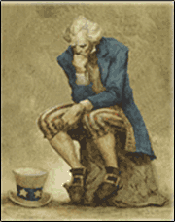
–>
August 20, 2022
Bob Welch. Saving My Enemy: How Two WWII Soldiers Fought against Each Other and Later Forger a Friendship That Saved Their Lives. Washington, DC: Regnery History. 366pp. $24.99.
‘); googletag.cmd.push(function () { googletag.display(‘div-gpt-ad-1609268089992-0’); }); }
Among the fabled lore of Gen Xers and Millennials is the notorious “dad book.” This book, adorning the shelves of Baby Boomers and being toted about on business trips as well as sporting events, is a staple of the childhoods of those born at the end of the Cold War. These books usually are, in fact, about the Cold War or perhaps the War on Terror (or some terrorist plot in the intermittent “End of History” 1990s). Authored by figures such as James Patterson, Clive Cussler, and especially Tom Clancy, dad books helped to enforce the narrative of the American Century. In this narrative, (Anglo-) American democracy struggled with and ultimately overcame fascism and communism and is currently battling various rogue terrorist actors.
There are “dad shows” and “dad movies,” which along with dad books form “dad media.” Within dad media, a middle-aged American male — usually a vet — acts as a spy or commando fighting to make the world safe for democracy. Dad media usually depict a flawed American military and intelligence establishment, and there are bad apples in the American establishment. The system itself, however, is fundamentally worth preserving.
One of the most popular stories in dad media is the struggle between Western liberalism and German National Socialism and its axis partners in Italy and Japan. There are many dad films that tell this story, including The Dirty Dozen (1967), The Longest Day (1962), The Great Escape (1963), and Patton (1969). While many of these films were released during the Vietnam era, the 1990s, saw a renewed interest in the second World War. With films such as Saving Private Ryan (1998) and Terrence Malick’s masterful The Thin Red Line (1998), a new generation was able to watch (usually with their dads) America’s struggle against Germany and Japan.
‘); googletag.cmd.push(function () { googletag.display(‘div-gpt-ad-1609270365559-0’); }); }
One of the most powerful and popular examples of dad media was the 2001 HBO series Band of Brothers. As the War on Terror rolled out, Americans sat transfixed to their TVs, viewing the struggles of Dick Winters, Don Malarkey, and Carwood Lipton of the 101st Airborne Division’s “Easy Company” from Camp Toccoa, Georgia to Berchtesgaden, Germany. Soon available on DVD, Band of Brothers became one of the first “binge series” as well as one of the first “boxed sets” of TV shows. While the series was deeply patriotic, it did not flinch in revealing some of the faults of its characters as well as some sympathy to the lives of German soldiers — there is the famous “German general speech” at the end, in which the members of Easy Company realize that, while their cause was just, the members of Wehrmacht against which they fought were also soldiers.
Populated with interviews from the then worn and weathered surviving members of Easy Company, Band of Brothers famously ended with a baseball game in which the fates of soldiers were narrated as they played “America’s Pastime.” Although there were several tragic deaths, the message conveyed by the narrator was that the men of Easy Company, after having defeated the National Social war machine, returned to the States and helped build the most prosperous economy and the highest standard of material living the world had ever seen.
.
The effects of the war itself, although touched upon in Band of Brothers — especially episodes such as “The Breaking Point” (Episode 7), did not get much attention.
Within his recent work, Saving My Enemy: How Two WWII Soldiers Fought against Each Other and Later Forged a Friendship That Saved Their Lives, Oregon writer Bob Welch depicts the effect of the war on the lives of not only a member of Easy Company, Welch’s fellow Oregonian Don Malarkey, but that of German soldier Fritz Engelbert, whose experience in the war cured him of his fanatical Nazism and led him onto a path of despair and then, ultimately, healing.
Welch had previously helped Sgt. Malarkey, who is played by Scott Grimes in the HBO series, write his 2009 memoires Easy Company Soldier. Malarkey was the last member of Easy Company to die, on September 30, 2017; however, Welch had access to his previous interviews with Malarkey. Although not an “anti-war” book in the key of Erich Maria Remarque’s All Quiet on the Western Front, Kurt Vonnegut’s Slaughterhouse-Five, or Joseph Heller’s Catch-22, Saving My Enemy is also not a Call of Duty–esque shoot-’em-up that glorifies death and destruction. It is a book about the human face of war and the power of forgiveness to transform hatred and delusional fanaticism.
‘); googletag.cmd.push(function () { googletag.display(‘div-gpt-ad-1609268078422-0’); }); } if (publir_show_ads) { document.write(“
Fritz Engelbert was born on May 10, 1925 in Hilchenbach, Germany, which is located near Frankfurt. Fritz’s childhood was punctuated by the traumatic aftermath of World War I. Germany was defeated and humiliated; unemployed and disabled veterans wandered the streets in a state of disenchantment. However, an obscure Austrian painter turned politician gave the people a sense of purpose. Adolf Hitler’s Mein Kampf was a national bestseller in Fritz’s youth, and Fritz, like other German young people, was inundated with propaganda. Fritz became a member of the Jungvolk and would later join the Hitler Youth at fourteen. Above his bed, he hung a poster of Adolf Hitler with an accompanying placard that read, Jugend dient dem Fuhrer, or “Youth serves the Fuhrer.”
Fitz’s parents, Fritz Sr. and Anna, were not Nazis, however. His father, hoped that the younger Fritz would take over the family business. Fritz Sr. was a Social Democrat who had fought in World War I — Fritz Sr.’s father, also called “Fritz,” fought in the Franco-Prussian War a generation earlier. Fritz Sr. was himself disenchanted by the experience of the First World War.
The youngest Fritz later joined the Wehrmacht. However, Fritz was soon disenchanted by the experience, treated badly by his superiors. After the war, he immersed himself in his work to escape his demons. Yet he could not escape the trauma.
Don Malarkey was born into the Irish community of Astoria, Oregon. As opposed to Hitler Youth activities, young Don’s childhood was marked by pranks, marble shooting, and exploration of the Pacific Northwest with his half-Indian pal, Louie Jacobson. Later to become a parachuter in Easy Company, as a child, Don once jumped off a roof, using an umbrella as a parachute.
Don’s family had been financially successful but began to struggle. As a result, Don himself went to work as a seiner, corralling fish on the Columbia River and worked nights at the Liberty Grill. Don liked politics and poems such as Rudyard Kipling’s “Gunga Din” and William Ernest Henley’s “Invictus.”
After Japan bombed Pearl Harbor, young Don enlisted. Two of his uncles had fought and died in World War I, and the young Don was concerned about the rise of totalitarianism.
Don’s experience in World War II was livelier and harsher than Fritz’s. Like Fritz, Don went to work and formed a family after the war. Although he was treated as a war hero and lionized around the world — especially after the release of Band of Brothers — Don, like Fritz, suffered emotional wounds.
Both wounds were healed when the two men met at an Easy Company reunion. Having seen Vietnam vets meeting their enemies inspired Bill Maloney to invite German soldiers to the Easy Company reunions. The Easy Company men were receptive except for a couple, including Philadelphian William Guarnere, who told Fritz that he would have killed him 60 years ago, punctuating his comment with a throat slash. Malarkey saved the scene by toasting Fritz and welcoming him to the Band of Brothers.
Over time, the two and their families would meet several times, forging a bond and helping each other come to peace over their sense of guilt for participating in the war. (Malarkey felt horrible about having killed other human beings.)
Saving My Enemy is a book about the pain of trauma and war, but also the power of love and forgiveness. It is this message of love and forgiveness, much more than conquest and technological triumph, lies at the heart of Western civilization.

Image via Pxhere.
<!– if(page_width_onload <= 479) { document.write("
“); googletag.cmd.push(function() { googletag.display(‘div-gpt-ad-1345489840937-4’); }); } –> If you experience technical problems, please write to [email protected]
FOLLOW US ON
<!–
–>
<!– _qoptions={ qacct:”p-9bKF-NgTuSFM6″ }; ![]() –> <!—-> <!– var addthis_share = { email_template: “new_template” } –>
–> <!—-> <!– var addthis_share = { email_template: “new_template” } –>






